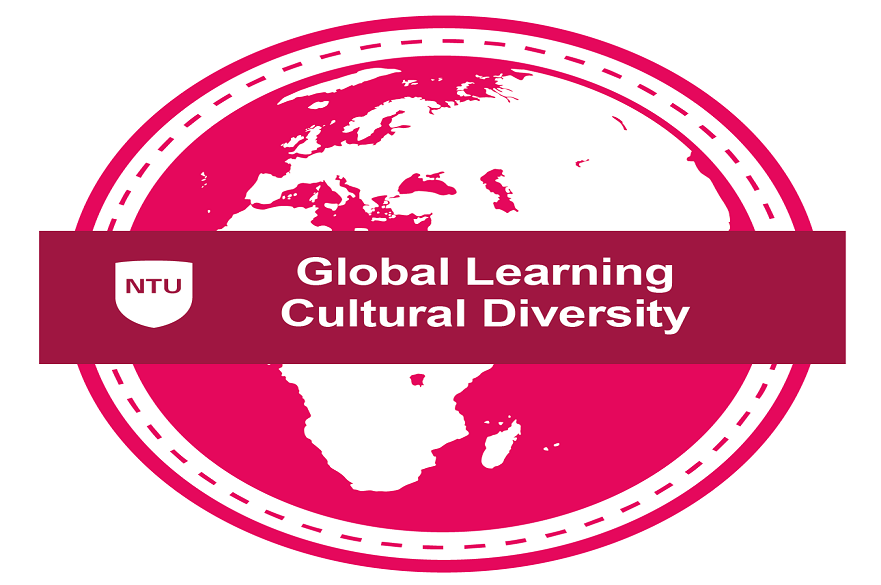Online courses
Our exciting week-long online courses take place from Friday 30 June to Friday 7 July 2023.

Our credit-bearing courses start with an orientation and welcome on Friday 30 June, a weekend of virtual social activities, then formal teaching beginning on Monday 3 July. You’ll have chance to meet other students and our NTU Student Buddies, introduce yourself to your course tutors and familiarise yourself with our teaching and learning platforms.
You will learn through a mixture of guided online activities and live lectures and discussions. You can expect 2-3 hours of direct contact with your NTU tutor each day. Scheduled live sessions typically take place between 13:00 and 16:00 BST.

On successful completion of your course, you will receive a Digital Badge and a results transcript confirming your 5 UK credits. You can also achieve our Cultural Diversity badge by joining in with our social and cultural programme.
Our social and cultural programme is designed to fit with different time-zones and will run throughout the week. This includes our Inter-Cultural Communication Workshop, and a session hosted by our NTU Alumni and Employability team on how to use the transferable skills and knowledge you have gained from your summer course to enhance your resume to future employers.
This course will introduce you to current debates concerning crime and the media. You will explore how crime news is constructed rather than being purely factual, and delve into topics like fake news, true crime, and crime fiction.
Topics include:
- Theoretical analysis from criminology, sociology, media studies and cultural studies to provide a critical understanding of the relationship between media and crime
- Ways in which crime news are constructed and leads to feelings of fear and insecurity towards certain crimes, spaces, and certain social groups
- Examination of illustrative themes to address the extent to which crime and justice are constructed according to prevailing cultural assumptions and ideologies
- A focus on moral panics; media representation of police, offenders and victims; true crime; crime fiction.
After this course, you should be able to:
- Understand theories shaping the academic fields of criminology and media studies
- Recognise ‘media effects’ debate: its origins and its influence on contemporary debates about media, crime, and victimisation
- Analyse public fears and anxieties shaping the media surrounding the Criminal Justice System agencies and actors
- Develop a critical view of the ways in which media and popular culture have helped us to conceptualise various forms of response to criminological issues.
The course is ideal for university students with an interest in this area and who meet our English language requirements.
Assessment: you will prepare and deliver a Pecha Kucha presentation about one aspect of the course.
Course Tutor: Dr. Thais Sardá, Lecturer, School of Social Sciences
This accredited course introduces environmental crime and wildlife crime and how justice systems deal with and respond to current threats to the environment and non-human nature. The course develops knowledge and skills appropriate to working in the environmental justice sector, with NGOs, local authorities, and policy networks.
This course also prepares students for further study of the topic at postgraduate level.
This course includes:
- An introduction to green criminology
- The causes of environmental crime and criminality
- Climate change
- Criminology and climate justice
- Corporate environmental crime
- Repairing environmental harms.
- After this course, you should be able to:
- Apply the principles of green criminology to contemporary environmental crime problems
- Demonstrate understanding of the importance attached to ideas of environmental harm and environmental crime
- Demonstrate the ability to effectively explain how different justice approaches can be applied to contemporary environmental problems
- Assess the effectiveness of different approaches to addressing environmental crime.
This course is ideal for undergraduate criminology and law students, and those looking for an introduction to environmental and wildlife crime issues.
This course will include live sessions and activities, quizzes, tutor videos and directed discussions.
This online course, designed and delivered with support from autistic people and their families, critically appraises different perspectives and approaches for understanding autism.
It introduces both traditional and contemporary issues in autism, discusses lived experiences of autistic individuals and their families, and raises awareness about autism across the globe.
During the course you will explore:
- Traditional perspectives and core characteristics of autism
- Contemporary perspectives and co-occurring conditions of autism
- Autism across cultures.
After this course, you should be able to:
- Demonstrate critical awareness and appreciation of different perspectives and approaches in understanding autism;
- Evaluate the relevance of theory and research applications in understanding autism;
- Critically use a range of resources, including primary research papers, to support or challenge an argument related to autism;
- Effectively communicate and objectively analyse sensitive ideas and concepts related to autism.
You will participate in live activities, online discussion forums, and research activities. You will also be expected to undertake guided independent learning including suggested reading and watch videos.
This course is ideal for university students with an interest in this area and who meet our English language requirements.
Assessment: group presentation.
Tutor: Dr Lai-Sang Iao, Course Leader, MSc Applied Child Psychology
Suggested Reading:
- Boucher, J. (2022) Autism spectrum disorders: Characteristics, causes and practical issues. Sage
- Fletcher-Watson, S., & Happé, F. (2019) Autism: A new introduction to psychological theory and current debate. Routledge
- Frith, U. (2003) Autism: Explaining the enigma. Blackwell Publishing
This course aims to connect Engineering students from various disciplines from across the globe. In international teams, aspiring engineers will be tasked to develop innovative Engineering solutions for sustainability challenges and how changes could be implemented. You will be supported by an academic mentor. Your findings will be presented during the EROS International Showcase providing an opportunity for you to share them with students around the world and staff at NTU.
The sustainability themes for the course are:
- Healthcare
- Energy consumption and management
- Product design
- Sanitation and water management
- Production and consumption
- United Nations Sustainable Development Goals.
After this course, you should be able to:
- Identity local/national/international sustainability challenges
- Critically evaluate current ways of addressing local/national/international sustainability challenges
- Develop innovative Engineering solutions for current sustainability challenges and how these could be implemented
- Work in international teams with aspiring Engineers across the global through online collaboration
- Present findings to peers and professional engineers.
This course is ideal for international undergraduate engineering students.
Assessment: group presentation during the EROS International Showcase.
Course Tutors: Mehdi Zeinali and Yvonne Reinwald, Lecturers, Department of Engineering
"It introduced many new topics through research and the presentations showcase. The organisation was great and the mentors were lovely." Karim Bibars - GSS Online 2022
This credit bearing course will take you on an exciting and transformative journey through the philosophical and practical foundations of well-being and happiness!
- Find out about well-being, how it can be measured, and why it matters.
- Explore the ‘Science of Strengths and Virtues’ and how these matter to health and well-being.
- Explore ways in which a sense of purpose and meaning can be developed from one’s life, moment-by-moment.
- Examine positive psychological interventions and how these could be designed for a range of people including those who have experienced trauma.
This course will include live sessions and activities, quizzes, tutor videos and directed discussions.
After this course you should be able to:
- Identify the core scientific methods for carrying out positive psychological research and intervention.
- Understand essential positive psychology concepts and how they are put into practice.
- Recognise important principles for effective intervention planning with a positive psychology emphasis.
- Apply positive psychological principles and practices to help yourself and others’ mental health and well-being.
- Utilise theoretical and evidence-based knowledge to understand your own experiences and enhance your levels of self-awareness.
This course is ideal for undergraduate students with an interest in this subject.
Assessment: During the course you will work together with your fellow students and tutors to design interventions that can benefit targeted groups of people. At the end of the course, you will share your group work with your peers and tutors on the course in the form of a poster presentation.
Your course tutors: Dr Glenn Williams - Principal Lecturer, Ed Griffin – Senior Lecturer, School of Social Sciences
This innovative course explores leadership and contemporary challenges through the lens of the United Nations (UN) Sustainable Development Goals (SDGs). You will investigate what is needed to become a transformational leader or ‘changemaker’ through a programme of debates and discussions, lectures, seminars, group activities and individual reflective exercises. Collaborating in small groups you will produce an output which proposes a sustainability solution and displays your new-found expertise in leadership and sustainability.
Each day will be themed around one of the UN 5Ps:
- people
- planet
- partnership
- peace
- prosperity.
After this course, you should be able to:
- Demonstrate understanding of sustainability as a concept including how it relates to the UN SDGs and your own academic discipline
- Identify leadership skills, qualities and attributes
- Exemplify carbon literacy
- Identify solutions to sustainability challenges
- Produce professional and visually impactful project outputs.
This course will include live sessions and activities, quizzes, tutor videos, and directed discussions.
Assessment: a group presentation of up to 10 minutes duration online through Teams to Tutors and peers using PPT slides. You will also produce a reflective workbook.
Course Tutors; Helen Puntha and Prof. Petra Molthan-Hill - NTU Green Academy
The professors were so interactive with the students, they were so open to new thoughts and were creative in the way they taught us. Each student was made to feel special and given importance. I interacted with students and the professors like my family!
Anya Raghuvanshi, Online Global Summer School student, 2021
Fees and requirements
Requirements
As well as an interest in your chosen subject, we expect students to:
- Meet our English Language Requirements
- Have access to high-speed internet.
- Be keen to engage with tutors and other students.
- Commit to the hours outlined for each programme.
- Be open to other backgrounds and cultures and be willing to share your own.
Fees and discounts
The fee for online courses is £125 (£50 for current NTU students).
Please pay your fee quickly to secure your place on your chosen course. The payment deadline is 21 May 2023.

The application deadline is 1 June 2023. Please complete our online application form as soon as possible.
Once you have applied, we will be in touch with more details about your course and how to join.